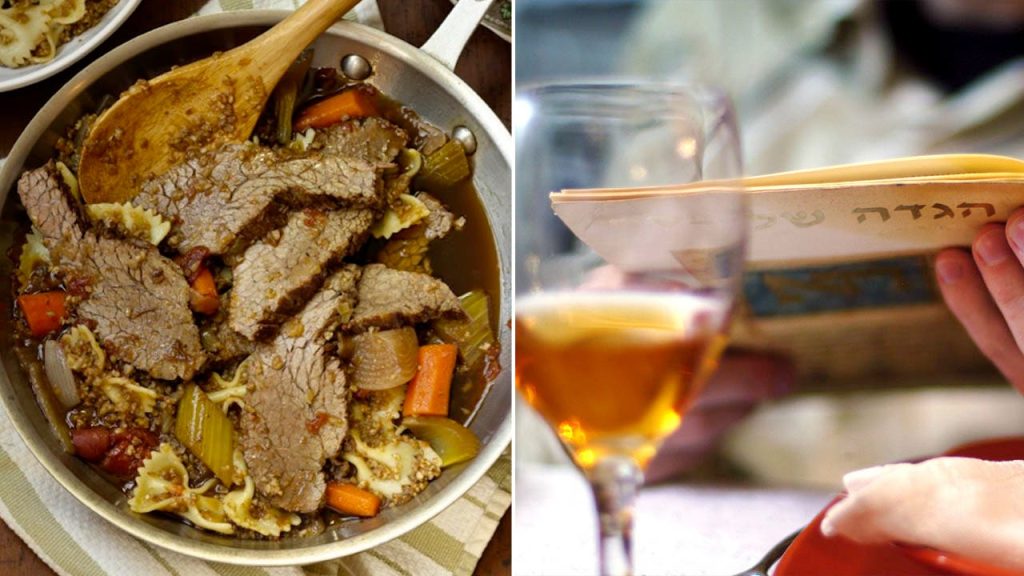Passover, a Jewish holiday celebrated to honor the Israelites’ freedom from slavery in Egypt, begins on Monday, April 22. To commemorate the holiday, New York-based author June Hersh is sharing a brisket recipe from her book titled “Food, Hope & Resilience: Authentic Recipes and Remarkable Stories from Holocaust Survivors.” This recipe belonged to Judith Ginsburg, a Holocaust survivor who had a remarkable story of survival. Born in Lida, Poland, Judith was ghettoized and later escaped to fight alongside Russian partisans. She eventually joined the Bielski Brigade of partisans, who saved over 1,200 Jews and survived in the woods of Poland until they were liberated. Hersh describes Judith’s brisket recipe as an Ashkenazi style dish that is simple and savory, perfect for Passover, a holiday that celebrates freedom and renewal.
For this recipe, Hersh recommends using a 5-to-6 pound brisket, preferably the second cut with the top fatty layer intact for added flavor and juiciness. The brisket is seasoned with kosher salt, pepper, paprika, and garlic powder, then roasted in a covered pan with carrots, onions, and garlic. The meat is cooked until fork-tender, about 4 hours, with occasional checks to prevent scorching. Once done, the brisket is thinly sliced against the grain and returned to the roasting pan to simmer in a sauce made from tomato soup, ketchup, brown sugar, and vinegar. The dish can be served immediately or allowed to marinate in the flavorful sauce overnight in the fridge for even better taste.
The brisket recipe shared by Hersh is a tribute to Judith Ginsburg’s survival and resilience during the Holocaust. Judith’s story of escaping ghettoization, fighting alongside partisans, and eventually joining the Bielski Brigade of partisans inspired the creation of this dish. Her Ashkenazi style of cooking is reflected in the straightforward and savory brisket recipe, which is perfect for celebrating freedom and renewal during Passover. By sharing Judith’s recipe, Hersh hopes to honor her memory and keep her story alive for future generations to appreciate.
In sharing this recipe, Hersh hopes to pay tribute to Judith Ginsburg’s legacy and the resilience of Holocaust survivors. The brisket dish, with its rich flavors and history, serves as a reminder of the strength and courage of those who faced unimaginable challenges and managed to survive. By commemorating Passover with this recipe, individuals can reflect on the themes of freedom and renewal, while also honoring the memory of those who endured great hardships. Through food and storytelling, Hersh aims to preserve the stories of Holocaust survivors like Judith and ensure that their experiences are remembered for generations to come.
The brisket recipe shared by Hersh is a testament to the enduring legacy of Holocaust survivors and the importance of remembering their stories. By honoring Judith Ginsburg’s memory through this dish, Hersh hopes to celebrate the resilience and courage of individuals who survived one of the darkest periods in history. The recipe is a way to pay homage to Judith’s spirit and the sacrifices she made to ensure the survival of herself and others. As Passover approaches, individuals can commemorate the holiday by preparing this savory and symbolic brisket, which represents the themes of freedom, resilience, and hope that are central to the Jewish faith and the holiday itself.
Overall, the brisket recipe shared by June Hersh is a tribute to Holocaust survivor Judith Ginsburg and a way to honor her memory during the Passover holiday. By preserving and sharing Judith’s recipe, Hersh is ensuring that her story lives on and that future generations can appreciate her resilience and courage. The dish is a symbolic celebration of freedom and renewal, reflecting the themes of Passover and the enduring spirit of those who have overcome adversity. Through food and storytelling, Hersh is keeping the memory of Judith Ginsburg and other Holocaust survivors alive, ensuring that their stories continue to inspire and educate others about the importance of remembrance and resilience.


